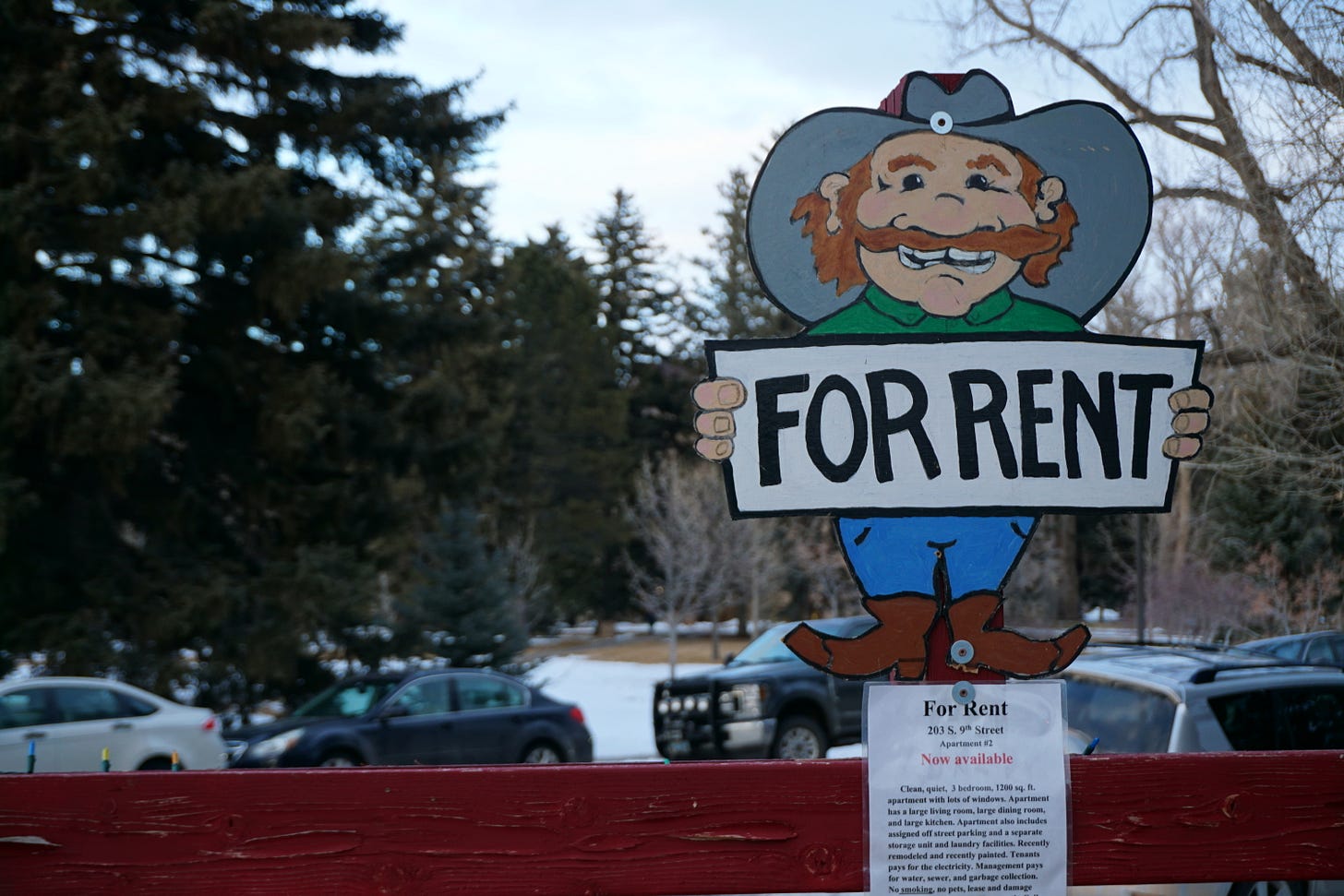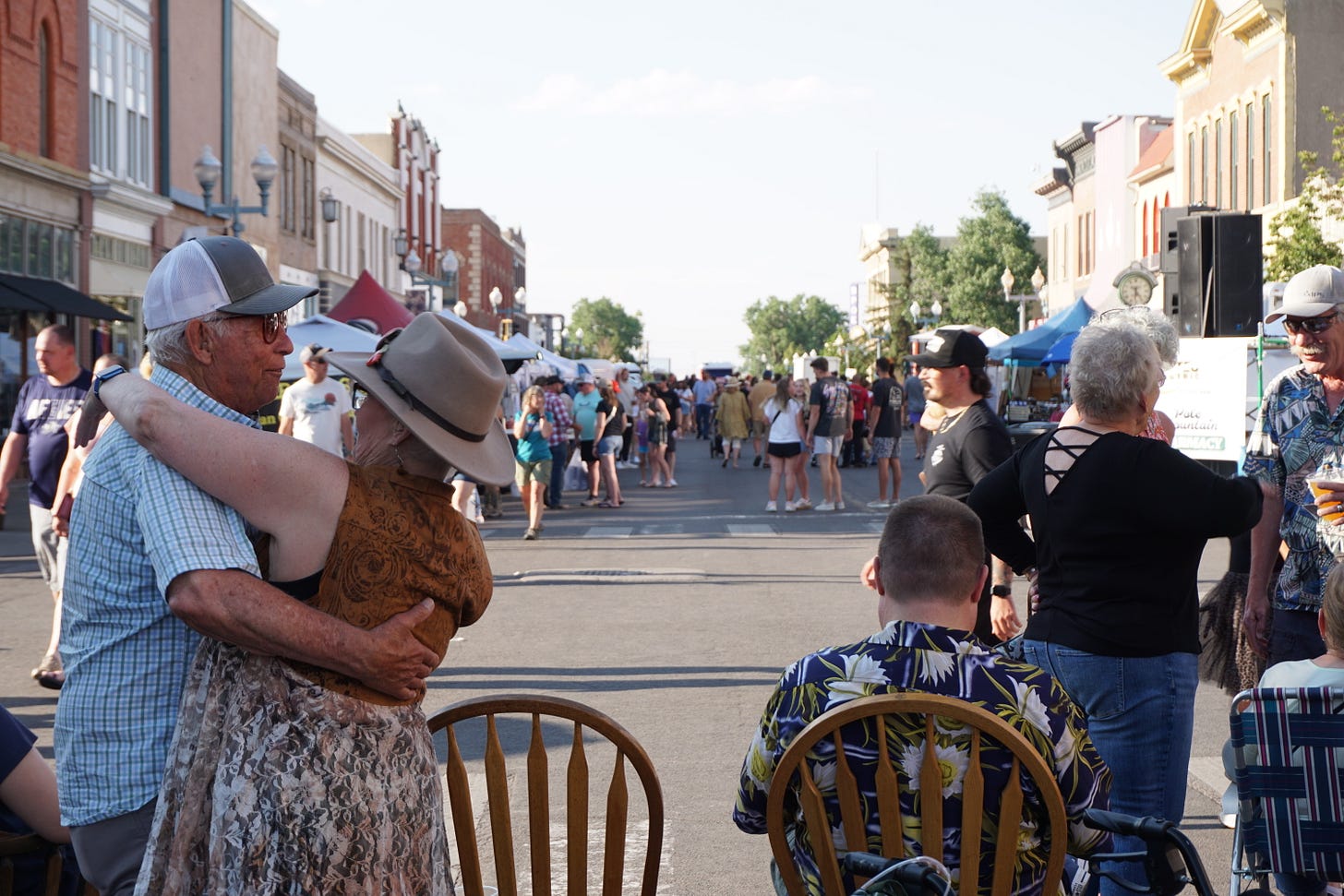Laramie City Council Ward 1 candidate questionnaire responses
All but one candidate running in the Ward 1 city council race completed the Laramie Reporter's questionnaire. The questions explore housing, parking, policing, budgets and more.
This post serves as a supplement to the Laramie Reporter’s story reviewing the Ward 1 candidates, their competing visions for the city and what’s at stake in this year’s city council elections. If you haven’t read that story, check it out here.

In your view, what is the biggest issue facing the city?
WILLIAM BOWLING: Housing. And you have to come at the issue from several angles, including both sensible development, and public safety. Simply put, we need more affordable housing units, and we’ll never be able to do that with just single family homes. We also need to make sure that the 54% of us that rent, including myself, have access to safe and affordable rental units. Housing is the most important and arguably most complicated issue facing Laramie.
SHARON CUMBIE: It’s hard to select one, so I’ll choose a broad one: maintaining and improving the community infrastructure that our residents and businesses depend on, and that will help attract additional economic development and diversity. This infrastructure includes not only basic services like those mentioned above, but also big-picture issues like affordable housing and wider economic opportunities. We don’t have enough money for everything, so we need to continue creating cooperative efforts and resource sharing between City and County and in collaboration with our community agencies and organization. Working together we can address pressing issues more effectively.
ROXIE HENSLEY: Laramie must adopt a business-friendly attitude such that the private sector will be incentivized to invest in the City’s revitalization. As host to UW, the City should be welcoming, of course, but should also provide the atmosphere and socialization opportunities that young people desire and in fact need. Entrepreneurs will recognize and respond to those needs if the City removes roadblocks to their implementation. A petty bureaucracy fueled by numerous and competing social goals is an impediment to energetic people who just want to get the job done. Regulation has its place but should not be rigid. Its OK to encourage landscaping but counting trees per acre is petty.
PAUL MONTOYA: One of my biggest concerns was the amazing amount of money we pay our top city administrators. Our City Manager makes $183,000 per year, with a $10,000 per year retention bonus, and a $500 per month car allowance. This is more money than the governor of Wyoming and any other city official in the state. I have no issue with people making a large salary but based on performance, this is unwarranted. This money spent could be better spent on things that directly affect people in need within our community. At a time of housing shortages, rental shortages and poor roads, extravagant salaries are not deserved.
Incentivizing affordable housing development has been a major theme for the current council and the city is now considering its next steps for that push. Should the city seek to encourage affordable housing development? And if so, how?
BOWLING: Yes. I think the city council is already doing a good job of considering many options, and I commend city staff for really putting together comprehensive presentations that make this difficult issue easier to understand. We need denser, multi-family homes. How? Zoning elimination seems like a no go. I do think that exploring fee and requirement reductions, and infilling existing lots need more exploration. I also believe that following principles of soft overlay, so our beautiful neighborhoods retain their unique character is rather important.
CUMBIE: I supported the renter safety ordinance, and development of more safe, affordable housing, which remains a priority for me. However, it’s a complicated issue to address. Several groups with representation from many aspects related to housing have been meeting and developing a coalition to address issues related to housing. I believe it is essential to have broad-base representation to properly analyze the issues, identify promoting and impeding factors, and to develop a plan that is community-based. City Council needs to continue to identify and modify regulations, zoning, and other factors that may further promote housing development.
HENSLEY: If there is truly a need for additional affordable housing (and I believe that there is) the private sector will respond to that need so long as the economics make sense. If the goal is AFFORDABLE housing, the project cannot be burdened with other competing goals. It costs money, for instance, to build green. It costs money [to] navigate the bureaucracy. Putting together a task force to work through these issues with competent developers is a better strategy than having City officials dictate standards and goals. I am not talking about constructing substandard housing but rather finding realistic ways to reduce costs. It’s in the name, in order to qualify as affordable, it has to cost less.
MONTOYA: I feel the best way for the city to encourage affordable housing is to streamline the processes the city administers. In talking to builders and developers, processing times for applications can take months. We need to improve on that. We can’t ignore rental housing either. We need to find ways to increase the number of rental units on the market by continuing to encourage multi-family development.

In early 2022, the council passed rental regulations, outlining health and safety standards, requiring landlords to register and establishing a complaint process. Many landlords remain unregistered. What should the city do to improve its rental regulations?
BOWLING: Laramie’s rental ordinance is just common sense public safety, and one of the most important ordinances the city has passed recently. Renters should have basic amenities, safe living conditions, and a mechanism to address issues that may arise. We should be working to strengthen and codify those regulations, and I think that there needs to be a dedicated city staff that works solely on enforcement and compliance. I am among the 54% of us that this issue most impacts. I’ve always been a renter. I may be a renter my whole life! The reality of someone in my generation being able to purchase a home is much different that of my parents.
CUMBIE: I supported the renter safety ordinance and remain committed to strengthening it and making it work for both renters and landlords. It’s to everyone’s benefit to have clear standards and a local dispute resolution process that can actually work. I think the City will have to commit some staff time to enforcement, such as following up on rental registrations, and perhaps impose fines to help pay for enforcement. The claim that the ordinance only raises costs for renters is bogus; the expenses required can be written off for tax purposes by landlords. All we’re asking for here is basic health and safety.
HENSLEY: Another one size fits all solution that will counteract the expressed need for affordable housing. I would suggest a Renters ombudsman tasked with investigating and resolving renter complaints using current code enforcement as the means of compliance.
MONTOYA: The purpose of the 2022 “8-83” regulations were to afford safe, healthy living for all that rent in Laramie. This is important for a strong rental environment. 54% of Laramie residents rent. Yet we have a shortage of rental units. Much of this is because of our large student population. I believe we need to work with builder/contractors, university housing and WyoTech to work with providing affordable rental housing. Many landlords do remain unregistered. Like any other things of a compliance nature, we need to find out why resident landlords are hesitant to comply and address the issue. Mobile home rentals are something many people forget about when talking about rentals. Hopefully by encouraging building new rental opportunities we can eliminate substandard housing in Laramie.
Policing has been another hot topic for the current council. Do you believe the police advisory board is working? And should Laramie reconsider establishing a civilian oversight board?
BOWLING: I believe it’s too early to answer this. The Police Advisory board hasn’t been in operation a full year yet, so there’s really no way to assess its effectiveness in such a short amount of time. The board was essentially a compromise when the oversight proposal was rejected, and I think we owe it to the advisory board to give them some more time to work before we start exploring other possibilities.
CUMBIE: I have focused on working to facilitate connections between the mental health [people] and law enforcement. As Council Liaison to the Police Advisory Board, I have participated in ongoing training activities and engaged in establishing goals and future directions. Many hours of community members’ time went into examining ideas about what kind of board would meet the expectations of different constituencies. The advisory board emerged as a compromise and needs time and space to mature as a cohesive group. The current priority for the Board is to engage in community outreach activities to increase transparency regarding Board mission, goals, and activities.
HENSLEY: The Police is a department of the city government and as such is governed by the City Council. The Police chief is an employee, and he is tasked with managing HIS DEPARTMENT LIKE ANY OTHER DEPARTMENT MANAGER. The Council is directly responsible for the overall policy and should communicate that policy with the Chief and hold him responsible for compliance.
MONTOYA: When I talked to Police Chief [Brian] Browne about the police advisory board, he was enthusiastic about its possibilities of building strong relationships between members of law enforcement and the community. Without his support of the advisory board, I feel it would be doomed to failure. I admittedly have not attended any of the advisory board meetings but by all reports it seems to be maintaining its goal of building better community relationships. As to establishing a civilian oversight board, I feel we need to see if the police advisory board can accomplish the same outcome. Laramie currently has over 30 boards and commissions now. We added three in the last year.

The city of Laramie has set a midcentury carbon neutrality goal. It has also made frequent use of Rocky Mountain Power’s Blue Sky Grant program and recently approved an emissions reduction plan. Do you support these efforts by the city to address climate change? If so, what more should the city do on this front?
BOWLING: I do support the city’s efforts around climate change measures, especially the emissions plan, and I’d commend the County Commission for also pursuing these measures. Implementation is a different ballgame, and it’s going to take time, money and likely compromise to bring some of the proposals into effect. I do think the city should be pursuing additional solar projects, and electric vehicle charging stations.
CUMBIE: I have supported the City’s efforts to address climate change and will continue to do so, because it’s first and foremost a budgetary issue: how do we prepare for the future in a way that will make the best use of taxpayers’ money? We should continue applying for grants for solar installations on government buildings, promoting recycling programs that keep us from filling up the landfill prematurely, and continue exploring energy efficiency options that save money. I am committed to continued proactive development and support of City-Community actions to address climate change.
HENSLEY: Honestly, Laramie’ carbon footprint, on a planetary scale, is insignificant. Individuals have unlimited opportunities to reduce their carbon footprint and it should not be the Laramie City Council’s job to enforce those decisions.
MONTOYA: I attended the dedication ceremonies for the Blue Sky Grants for the Ice and Events Center, Recreation Center, Downtown Clinic and Fire Department. These are great advances in providing localized power production with the help of Rocky Mountain Power. As a participant with the Alliance for Renewable Energy (ARE) here in Laramie, I am hopeful that we can work toward better policies regarding net-metering. This would hopefully encourage more local businesses and homeowners to consider localized power production.
Public transportation is lacking in Laramie, but there is growing interest in addressing that problem. What role can the city play when it comes to encouraging or expanding public transit?
BOWLING: I was speaking last week with a community member who lives in the south of ward 1. She doesn’t drive, and said she used to take the bus route over to the Safeway and Planet fitness. It was the most affordable gym and she loved going. I’d honestly like to see that route restored. The idea of increased public transit is also inextricably linked to our emissions reduction plans.
CUMBIE: With increasing interest in addressing climate change issues, there are currently significant grants available to foster public transportation. But these grants require that the community have an active Transportation Authority Board. In collaboration with the County Commission, we have now re-activated the Intergovernmental Transportation Board and subsequently received a grant to support startup activities. Initially, the Board will work to build on the efforts that have been started by Laramie nonprofits and University of Wyoming to provide transportation in our community through dynamic partnership and shared resources. I believe this collaborative partnership approach has high potential for success.
HENSLEY: I would love to see a streetcar line connecting Downtown with the Campus. It would not only alleviate parking issues at UW, but it would also spur downtown economic development. Seniors and students and Uber and Lyft service the private sector. Anything further would likely be uneconomical. We Already have a transportation network.
MONTOYA: Laramie has a good start to public transportation bus service with the UW Transit System. At least during the academic season. Providing services as far west as downtown and as far east as the Walmart we have a good start. The city and University can look for grant opportunities to expand this service in the future. I’m not sure the city has the financial ability to support an independent city bus service, so I feel the best option is to work in coordination with UW.
Parking is perhaps the council’s hottest issue of all. I want to know how important it is to you. Is it ever appropriate to eliminate parking for climate, bikeability, housing or economic development goals?
BOWLING: Parking is certainly THE issue. Hard to answer this question without making someone angry! I do not think we should be eliminating any parking, and yes, we do have to address housing, transit, and climate. I believe that due to recent events these issues have been unnecessarily linked. There are a myriad of options to address development etc. without eliminating parking.
CUMBIE: I think we must consider parking in the context of other shared goals. A recent City Council work session, widely attended by the public, revealed basic problems that were related to parking use, rather than the lack of available parking; we need better enforcement. Most know the phrase, “Build it and they will come”. I believe that working to improve pedestrian pathways and to establish safer, clearly marked bike lanes will make it increasingly desirable for individuals to engage in alternative modes of transportation. Improving the entire mobility infrastructure has the potential to reduce the pressure on parking.
HENSLEY: I don’t think you can solve a parking shortage by eliminating existing parking. I think we must be innovative in finding new parking opportunities. In the 1980s Jackson decided that they would halt all new road construction even though both population and visitation were increasing. You can go there any day between May and October and realize the folly of that attitude. A day will come when parking issues are a thing of the past but in the meantime, we need to deal with the current reality. I would like to see a task force created to negotiate with UP Railroad for use of their mostly abandoned switchyard for downtown parking.
MONTOYA: As long as you have cars, motorcycles and bikes you will always have parking issues. Possibly in the future if other modes of transportation exist in Laramie you might have a lessening of the demand for parking. I don’t foresee the demand for parking diminishing in the near future. Public parking is important to support the economy of the city especially downtown.

Laramie has the most inclusive city government in Wyoming when it comes to serving its LGBTQ+ residents. Do you support the city’s efforts to become more inclusive — passing a nondiscrimination ordinance, reading Pride Month proclamations, establishing a human rights commission — and should the city be doing any more for its LGBTQ+ residents?
BOWLING: I am a member of the LGBTQ+ community, and I feel safe and supported in Laramie. I hope other members of the community feel the same. The question itself here really is the answer. We’ve passed a non-discrimination ordinance, and the council is vocal and present in its support of its LGBTQ+ citizens. Council could always work more closely with the great folks at Laramie Pride to make sure June events are promoted, safe and fun for everyone!
CUMBIE: I read the Pride Month proclamation before last year’s Pride parade and strongly support the City’s efforts to be inclusive and welcoming to all its residents. As noted earlier, as a member of the police advisory board, I place priority on mental health issues and creating a community climate that promotes personal safety and respect for others, including but not limited to the LGBTQ+ community.
HENSLEY: The founding principle of our government is that all men are created equal in the eyes of the law. With that in mind, I do not believe that any group should be singled out for special treatment.
MONTOYA: I have always thought that Laramie is one of the more diverse cities I have lived in. This is mostly because of the University of Wyoming. Being able to share and support cultures and varying lifestyles is one thing that makes Laramie a great place to live. I have a family member that is part of the LGBTQ community and a few years back she asked me if Laramie was anti-gay because of her hearing about the Mathew Shepard murder. She came to Laramie a few months later and realized what a loving community we really had. I hope most residents in Laramie realize how fortunate we are to live in such a diverse community.
When it comes to raising revenue and spending money, would you change anything about the city’s budget?
BOWLING: The city staff and council worked long and hard to arrive at the current budget and a lot of things could happen in the next two fiscal years. I would reserve any proposals for change until I was working with city staff and other councilors. I would do everything I could to educate the public on just how many services rely on the 5th penny and how important it is to renew it in two years.
CUMBIE: Every budget is a struggle between what we would like to have and what we can realistically afford. I’m very concerned about tax reductions that potentially put big holes in the city’s budget and end up hurting people by cutting back programs and services they depend on. I think the City has done a thoughtful job of keeping the cart in front of the horse, that is, doing things like fixing water mains before repaving streets, so that the paving needs to be done only once. I appreciate the proactive approach that City management and staff have toward infrastructure improvements.
HENSLEY: Every department, every line item of the budget should be scrutinized for efficiency and necessity. It is very easy to spend someone else’s money, but it is a basic responsibility of elected officials to do so wisely.
MONTOYA: This is a big issue for me. I mentioned the extreme salaries a little earlier, but other issues include out of control spending with little oversight. At a recent city council meeting they approved a $138,000 lawn mower. Over 20 million dollars was spent on a public works facility that originally was to cost very little in renovations. Over 1.4 million dollars will be spent this year on City Hall renovations. The Rec Center is being supported by 1.2 million dollars from the general fund versus 300,000 dollars just four years ago. The airport is showing a 120,000 dollar shortfall in its new budget. The budgets themselves need to be written in a more straight forward format. Current budgets now are 200-page documents that are impossible to decipher honest information.

What relationship should the city have to its community partners, such as the county government and the University of Wyoming?
BOWLING: It’s crucial to maintain and grow these relationships. The City and the County already have a joint aquifer protection plan, and it’s crucial to continue working together to keep pollutants out of the city wells. UW is our biggest employer, and the success of Laramie and the success of students at UW are one in the same.
CUMBIE: Cooperative work between the City and County on issues such as protection of our drinking water has greatly strengthened the protection as well as increased the cost effectiveness for taxpayers. UW brings many advantages to our community, but also the significant disadvantage of not paying taxes to help pay for the infrastructure it requires. I would like the City to have a more cooperative relationship with UW and will do my best to facilitate one.
HENSLEY: Laramie, UW and Albany County are almost indistinguishable and as such close cooperation with those entities is essential to a functioning government.
MONTOYA: No matter what anyone thinks, Laramie is a university town and in Wyoming “the” university town. We need to build strong relationships with the university not only because the university is our primary employer but also because Laramie provides the environment for attracting students and faculty to the university. We need each other. By being good community partners, we also can take advantage of the university to build alternative economic development. We have not done a very good job with that.




Montoya has some VERY interesting comments.
As of May 2024, Laramie City Manager Janine Jordan's annual salary is $173,074, plus benefits. This is more than the governor of Wyoming, who makes $105,000 per year, and the mayor of Cheyenne, who makes $94,391 per year.
Laramie has 23 city administrators making more than $100,000 per year, which is more than any other city in the state. City Manager Janine Jordan tops the list at an annual salary of $173,074 per year plus benefits.
This is absolutely stunning…